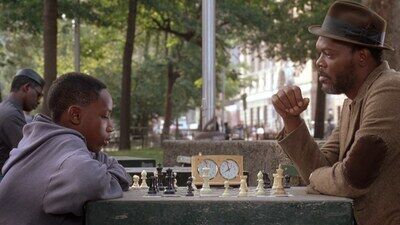With these films and stars, it was as if major Hollywood studios and smaller independent studios were trying to recreate the template that proved so financially advantageous during the heyday of Blaxploitation. Blaxploitation was an ethnic sub-genre of the action film that was wildly popular in the early-to-mid-1970s, following on the heels of the success of the Civil Rights Movement and the beginning of the Black Power Movement.

This brings us to writer-director Boaz Yakin’s 1994 feature directorial debut, “Fresh,” a truly unsung masterpiece of the ’90s urban-set crime drama genre. Shot entirely on location in New York in the summer of 1993, with a budget of $3.5 million, the film was a hit at the 1994 Sundance Film Festival, held in Park City, Utah, that January. Yakin won the Filmmakers Trophy – Dramatic prize, and the film itself was nominated for the festival’s biggest honor, the Grand Jury Prize – Dramatic competition.
The film stars newcomer Sean Nelson as the title character, Fresh, a savvy, observant, chess-playing preteen in Brooklyn, New York, who devises a plan utilizing strategies of the game to save himself and his drug-addicted older sister Nichole (played by N’Bushe Wright) from their seemingly desolate community, and more importantly, from the increasingly violent gangsters he runs drugs for. A 12-year-old Fresh somehow navigates the complexities of childhood (i.e., going to school, making curfew, the first sparks of young infatuation) with the increasingly dangerous responsibilities of criminal life (he is a drug runner, after all). His upbringing, environment, and chosen criminal hustle have forced him to be far more mature and worldly than any 12-year-old child should ever need to be. As Roger Ebert pointed out in his review, film characters are never at a loss for words, never repeating or doubting themselves, with kids routinely being written as hyper-articulate know-it-alls, often to a film’s detriment:
“‘Fresh’ isn’t like that,” Ebert wrote. “Here’s a movie filled with drama and excitement, unfolding a plot of brilliant complexity, in which the central character is solemn and silent, saying only what he has to say, revealing himself only strategically.”
“Fresh” doesn’t idolize its drug-dealing criminals. Purposefully or not, some other urban-set crime dramas, like “New Jack City” with its larger-than-life central villain Nino Brown (memorably played by Wesley Snipes, in a star-making, instantly iconic performance) have. Nino fancies himself an entrepreneur and a philanthropist of the highest order, much like his cinematic idol Tony Montana (memorably played by Al Pacino in Brian DePalma’s 1983 urban-set crime drama “Scarface”). Both Nino & Tony pride themselves on giving back to their respective communities, the same communities that they and their criminal regimes supply with endless amounts of highly addictive street drugs (chiefly, cocaine) for sale.

